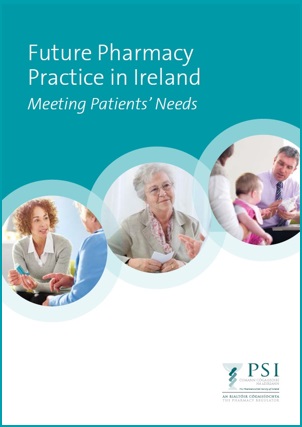Future Pharmacy Practice Project
As the pharmacy regulator, we work in the public interest to protect and promote the health, safety and  wellbeing of patients and the public. The PSI has a duty under legislation to take suitable action to improve the profession of pharmacy. It is with this in mind that the PSI Council commissioned the Future Pharmacy Practice Project in 2015.
wellbeing of patients and the public. The PSI has a duty under legislation to take suitable action to improve the profession of pharmacy. It is with this in mind that the PSI Council commissioned the Future Pharmacy Practice Project in 2015.
Future Pharmacy Practice in Ireland-Meeting Patients' Needs is the result of a research project, that included an extensive consultation process involving patients, healthcare professionals, including pharmacists, other regulatory bodies, and engagement with policy-makers including the Department of Health, HSE, and wider stakeholders.
Anticipating patients’ healthcare and medicines needs, the project examined the role pharmacists might play in public health and patient care improvements and healthcare system efficiencies that would benefit the public. The report also informs the role that the PSI will play in supporting pharmacists’ education and practice standards to meet these changes.
At the launch, attendees were asked for their thoughts on the report and the possibilities it presented.
The report includes a number of significant recommendations for the planning and delivery of pharmacy care and services in Ireland, anticipating patients needs and seeking to alleviate some of the challenges to the health system.
The new roles for pharmacists that are recommended in the latest report would see pharmacists:
-
Contributing to health and wellbeing initiatives through structured population health information and awareness campaigns and preventative medicine to support the maintenance and improvement of the health of the public;
-
Providing expertise in assisting patients to manage their chronic diseases and medication through structured initiatives and, where appropriate, through supplementary prescribing in collaboration with a patient’s GP;
-
Managing medicines throughout the patient care pathway via structured initiatives such as medication reviews for at-risk and vulnerable patients in the community and local settings e.g. nursing homes; and the greater presence of pharmacy throughout the patient pathway in acute settings, reducing prescribing errors and optimising the impact of medicines for patients.
Findings of the project have been very positive with pharmacy and pharmacists being recognised for their medicines expertise. Insight has also been gained into government policy and priorities and how pharmacy and pharmacists could potentially contribute in the future.
Four supporting papers are also available in conjunction with the main report. These provide greater information on the extent of consultation and background to research undertaken, including a report that considered opportunities for cost benefit.
Additional Information